List of United States Supreme Court cases, volume 71
| Supreme Court of the United States | |
|---|---|
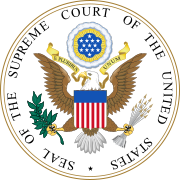 | |
| Established | March 4, 1789[1] |
| Location | Washington, D.C. |
| Coordinates | 38°53′26″N 77°00′16″W / 38.89056°N 77.00444°WCoordinates: 38°53′26″N 77°00′16″W / 38.89056°N 77.00444°W |
| Composition method | Presidential nomination with Senate confirmation |
| Authorized by | Constitution of the United States, Art. III, § 1 |
| Judge term length | life tenure, subject to impeachment and removal |
| Number of positions | 9 (by statute) |
| Website | supremecourt |
| Chief Justice of the United States | |
| Currently | John Roberts |
| Since | September 29, 2005 |
| This article is part of the series on the |
| Supreme Court of the United States |
|---|
 |
| The Court |
|
| Current membership |
|
| Lists of justices |
|
| Court functionaries |
|
|
| Constitutional law of the United States |
|---|
 |
| Overview |
|
| Principles |
|
| Government structure |
|
| Individual rights |
|
| Theory |
|
This is a list of the 57 cases reported in volume 71 (4 Wall.) of United States Reports, decided by the Supreme Court of the United States from April 1866 to April 1867.[2]
Nominative reports[]
In 1874, the U.S. government created the United States Reports, and retroactively numbered older privately-published case reports as part of the new series. As a result, cases appearing in volumes 1–90 of U.S. Reports have dual citation forms; one for the volume number of U.S. Reports, and one for the volume number of the reports named for the relevant reporter of decisions (these are called "nominative reports").
John William Wallace[]
Starting with the 66th volume of U.S. Reports, the Reporter of Decisions of the Supreme Court of the United States was John William Wallace. Wallace was Reporter of Decisions from 1863 to 1874, covering volumes 68 through 90 of United States Reports which correspond to volumes 1 through 23 of his Wallace's Reports. As such, the dual form of citation to, for example, Thompson v. Bowie is 71 U.S. (4 Wall.) 463 (1867).
Wallace's Reports were the final nominative reports for the US Supreme Court; starting with volume 91, cases were identified simply as "(volume #) U.S. (page #) (year)".
Justices of the Supreme Court at the time of 71 U.S. (4 Wall.)[]
The Supreme Court is established by Article III, Section 1 of the Constitution of the United States, which says: "The judicial Power of the United States, shall be vested in one supreme Court . . .". The size of the Court is not specified; the Constitution leaves it to Congress to set the number of justices. Under the Judiciary Act of 1789 Congress originally fixed the number of justices at six (one chief justice and five associate justices).[3] Since 1789 Congress has varied the size of the Court from six to seven, nine, ten, and back to nine justices (always including one chief justice). When the cases in 71 U.S. (4 Wall.) were decided the following nine justices were members of the Court:
| Portrait | Justice | Office | Home State | Succeeded | Date confirmed by the Senate (Vote) |
Tenure on Supreme Court |
|---|---|---|---|---|---|---|
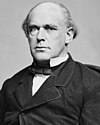
|
Salmon P. Chase | Chief Justice | Ohio | Roger B. Taney | December 6, 1864 (Acclamation) |
December 15, 1864 – May 7, 1873 (Died) |
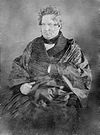 |
James Moore Wayne | Associate Justice | Georgia | William Johnson | January 9, 1835 (Acclamation) |
January 14, 1835 – July 5, 1867 (Died) |
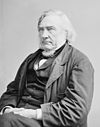 |
Samuel Nelson | Associate Justice | New York | Smith Thompson | February 14, 1845 (Acclamation) |
February 27, 1845 – November 28, 1872 (Retired) |
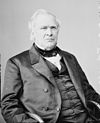 |
Robert Cooper Grier | Associate Justice | Pennsylvania | Henry Baldwin | August 4, 1846 (Acclamation) |
August 10, 1846 – January 31, 1870 (Retired) |
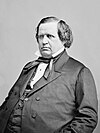
|
Nathan Clifford | Associate Justice | Maine | Benjamin Robbins Curtis | January 12, 1858 (26–23) |
January 21, 1858 – July 25, 1881 (Died) |
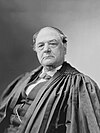
|
Noah Haynes Swayne | Associate Justice | Ohio | John McLean | January 24, 1862 (38–1) |
January 27, 1862 – January 24, 1881 (Retired) |

|
Samuel Freeman Miller | Associate Justice | Iowa | Peter Vivian Daniel | July 16, 1862 (Acclamation) |
July 21, 1862 – October 13, 1890 (Died) |
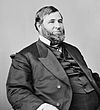
|
David Davis | Associate Justice | Illinois | John Archibald Campbell | December 8, 1862 (Acclamation) |
December 10, 1862 – March 4, 1877 (Resigned) |
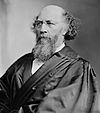
|
Stephen Johnson Field | Associate Justice | California | newly-created seat | March 10, 1863 (Acclamation) |
May 10, 1863 – December 1, 1897 (Retired) |
Notable Cases in 71 U.S. (4 Wall.)[]
Ex parte Milligan[]
Ex parte Milligan, 71 U.S. (4 Wall.) 2 (1866), is a Supreme Court decision that ruled unconstitutional the application of military tribunals to citizens when civilian courts are still operating. The Court held that "martial rule can never exist when the courts are open", and confined martial law to areas of "military operations, where war really prevails" and when it was a necessity to provide a substitute for a civil authority that had been overthrown.
Ex parte Garland[]
Ex parte Garland, 71 U.S. (4 Wall.) 333 (1866), is an important case involving the disbarment of former Confederate officials. The Supreme Court ruled that a statute prohibiting former Confederate government officials from serving in the US government was unconstitutional as being both a bill of attainder and an ex post facto law. The Court also held that lawyers are officers of the court, not officers of the United States, and that their removal must be an exercise of judicial power, not legislative power.
Mississippi v. Johnson[]
Mississippi v. Johnson, 71 U.S. (4 Wall.) 475 (1867), was the first suit to be brought against a President of the United States in the United States Supreme Court. The state of Mississippi attempted to sue President Andrew Johnson for enforcing Reconstruction. The Court ruled in favor of the president.
Citation style[]
Under the Judiciary Act of 1789 the federal court structure at the time comprised District Courts, which had general trial jurisdiction; Circuit Courts, which had mixed trial and appellate (from the US District Courts) jurisdiction; and the United States Supreme Court, which had appellate jurisdiction over the federal District and Circuit courts—and for certain issues over state courts. The Supreme Court also had limited original jurisdiction (i.e., in which cases could be filed directly with the Supreme Court without first having been heard by a lower federal or state court). There were one or more federal District Courts and/or Circuit Courts in each state, territory, or other geographical region.
Bluebook citation style is used for case names, citations, and jurisdictions.
- "C.C.D." = United States Circuit Court for the District of . . .
- e.g.,"C.C.D.N.J." = United States Circuit Court for the District of New Jersey
- "D." = United States District Court for the District of . . .
- e.g.,"D. Mass." = United States District Court for the District of Massachusetts
- "E." = Eastern; "M." = Middle; "N." = Northern; "S." = Southern; "W." = Western
- e.g.,"C.C.S.D.N.Y." = United States Circuit Court for the Southern District of New York
- e.g.,"M.D. Ala." = United States District Court for the Middle District of Alabama
- "Adm." = Admiralty Court (a federal court)
- "Ct. Cl." = United States Court of Claims
- "Ct. Com. Pl." = Court of Common Pleas (a state court)
- The abbreviation of a state's name alone indicates the highest appellate court in that state's judiciary at the time.
- e.g.,"Pa." = Supreme Court of Pennsylvania
- e.g.,"Me." = Supreme Judicial Court of Maine
List of cases in 71 U.S. (4 Wall.)[]
| Case Name | Page & year | Opinion of the Court | Concurring opinion(s) | Dissenting opinion(s) | Lower court | Disposition of case |
|---|---|---|---|---|---|---|
| Stearns v. United States | 1 (1867) | per curiam | none | none | not indicated | certiorari granted |
| Brobst v. Brobst | 2 (1867) | Chase | none | none | not indicated | remanded |
| Ex parte Milligan | 2 (1866) | Davis | Chase | none | C.C.D. Ind. | remanded to divided lower court |
| McGee v. Mathis | 143 (1866) | Chase | none | none | Ark. | reversed |
| United States v. Hoffman | 158 (1867) | Miller | none | none | N.D. Cal. | prohibition denied |
| Walker v. United States | 163 (1866) | Chase | none | none | C.C.E.D. La. | dismissed for want of jurisdiction |
| Brown v. Wiley | 165 (1867) | Chase | none | none | Sup. Ct. D.C. | dismissed for want of jurisdiction |
| Locke v. City of New Orleans | 172 (1867) | Field | none | none | La. | affirmed |
| Sturdy v. Jackaway | 174 (1867) | Grier | none | none | C.C.E.D. Ark. | remanded to divided lower court |
| Missouri & M.R.R. Co. v. Rock | 177 (1867) | Miller | none | none | Iowa | dismissed for want of jurisdiction |
| United States v. Dashiel | 182 (1866) | Nelson | none | none | W.D. Tex. | reversed |
| United States v. Allsbury | 186 (1866) | Nelson | none | none | W.D. Tex. | affirmed |
| Leftwitch v. Lecanu | 187 (1867) | Miller | none | none | C.C.E.D. La. | affirmed |
| City of New York v. Sheffield | 189 (1867) | Miller | none | none | C.C.S.D.N.Y. | affirmed |
| Christy v. Pridgeon | 196 (1866) | Field | none | none | E.D. Tex. | affirmed |
| Lanfear v. Hunley | 204 (1866) | Swayne | none | none | La. | affirmed |
| Witherspoon v. Duncan | 210 (1867) | Davis | none | none | Ark. | affirmed |
| Rutherford v. Geddes | 220 (1867) | Miller | none | none | C.C.E.D. La. | affirmed |
| Evans v. Patterson | 224 (1867) | Grier | none | none | C.C.W.D. Pa. | affirmed |
| Hughes v. United States | 232 (1866) | Field | none | none | C.C.E.D. La. | affirmed |
| Mitchell v. St. Maxent's Lessee | 237 (1866) | Davis | none | none | N.D. Fla. | affirmed |
| People ex rel. Duer v. City of New York | 244 (1867) | Nelson | none | Chase | N.Y. | affirmed |
| Graham v. United States | 259 (1867) | Field | none | none | D. Cal. | affirmed |
| Brown v. Bass | 262 (1867) | Nelson | none | none | C.C.S.D. Miss. | reversed |
| Mitchell v. Burlington & M.P. Plank Rd. Co. | 270 (1867) | Clifford | none | none | C.C.D. Iowa | reversed |
| Larned v. Burlington & M.P. Plank Rd. Co. | 275 (1867) | Clifford | none | none | C.C.D. Iowa | reversed |
| Cummings v. Missouri | 277 (1867) | Field | none | Miller | Mo. | reversed |
| Ex parte Garland | 333 (1867) | Field | none | Miller | original jurisdiction | membership in bar of Court confirmed |
| Barrows v. Kindred | 399 (1867) | Swayne | none | none | C.C.S.D. Ill. | reversed |
| United States v. Hathaway | 404 (1867) | Nelson | none | none | C.C.E.D. Mich. | remanded to divided lower court |
| United States v. Quimby | 408 (1867) | Nelson | none | none | C.C.E.D. Mich. | remanded to divided lower court |
| Gilman v. Lockwood | 409 (1867) | Clifford | none | none | C.C.D. Wis. | reversed |
| The Moses Taylor | 411 (1867) | Field | none | none | Cal. Cnty. Ct. | reversed |
| Semple v. Hagar | 431 (1867) | Grier | none | none | Cal. | dismissed |
| Rock Island Cnty. v. United States | 435 (1867) | Swayne | none | none | C.C.N.D. Ill. | affirmed |
| Davidson v. Lanier | 447 (1867) | Chase | none | none | N.D. Miss. | reversed |
| Bradley v. Illinois | 459 (1867) | Nelson | none | none | Ill. | reversed |
| Thompson v. Bowie | 463 (1867) | Davis | none | Grier | Sup. Ct. D.C. | reversed |
| Mississippi v. Johnson | 475 (1867) | Chase | none | none | original jurisdiction | dismissed for want of jurisdiction |
| Saulet v. Shepherd | 502 (1867) | Grier | none | none | C.C.E.D. La. | affirmed |
| Bentley v. Coyne | 509 (1867) | Clifford | none | none | C.C.E.D. Mich. | affirmed |
| Purcell v. Miner I | 513 (1867) | Grier | none | none | Sup. Ct. D.C. | affirmed |
| Purcell v. Miner II | 519 (1867) | Grier | none | none | Sup. Ct. D.C. | rehearing denied |
| Commissioner of Patents v. Whiteley | 522 (1867) | Swayne | none | none | Sup. Ct. D.C. | reversed |
| von Hoffman v. City of Quincy | 535 (1867) | Swayne | none | none | C.C.S.D. Ill. | reversed |
| The Hine | 555 (1867) | Miller | none | none | Iowa | reversed |
| Newell v. Nixon | 572 (1866) | Clifford | none | none | C.C.E.D. La. | affirmed |
| Sparrow v. Strong | 584 (1867) | Chase | none | none | Nev. | dismissed for want of jurisdiction |
| Bell v. Mobile & O.R.R. Co. | 598 (1867) | Davis | none | none | N.D. Miss. | affirmed |
| Ryan v. Thomas | 603 (1867) | Chase | none | none | Mo. | dismissed for want of jurisdiction |
| Pearson v. Duane | 605 (1867) | Davis | none | none | C.C.D. Cal. | remanded for reduction of damages |
| Ware v. United States | 617 (1867) | Clifford | none | none | C.C.E.D. Pa. | affirmed |
| The Nassau | 634 (1867) | Davis | none | none | C.C.S.D.N.Y. | affirmed |
| United States v. le Baron | 642 (1866) | Miller | none | none | C.C.S.D. Ala. | reversed |
| New Orleans R.R. Co. v. Lindsay | 650 (1866) | Swayne | none | none | C.C.E.D. La. | affirmed |
| Robbins v. City of Chicago | 657 (1867) | Clifford | none | none | C.C.N.D. Ill. | affirmed |
| United States v. McMasters | 680 (1866) | Nelson | none | none | C.C.E.D. La. | affirmed |
Notes and references[]
- ^ Lawson, Gary; Seidman, Guy (2001). "When Did the Constitution Become Law?". Notre Dame Law Review. 77: 1–37.
- ^ Anne Ashmore, DATES OF SUPREME COURT DECISIONS AND ARGUMENTS, Library, Supreme Court of the United States, 26 December 2018.
- ^ "Supreme Court Research Guide". Georgetown Law Library. Retrieved April 7, 2021.
See also[]
certificate of division
External links[]
- [1] Case reports in volume 71 (4 Wall.) from Court Listener
- [2] Case reports in volume 71 (4 Wall.) from the Caselaw Access Project of Harvard Law School
- [3] Case reports in volume 71 (4 Wall.) from Google Scholar
- [4] Case reports in volume 71 (4 Wall.) of Justia
- [5] Case reports in volume 71 (4 Wall.) from Open Jurist
- Website of the United States Supreme Court
- United States Courts website about the Supreme Court
- National Archives, Records of the Supreme Court of the United States
- American Bar Association, How Does the Supreme Court Work?
- The Supreme Court Historical Society
- Lists of United States Supreme Court cases by volume
- Lists of United States Supreme Court cases
- United States Supreme Court cases
- United States case law lists
- 1866 in United States case law
- 1867 in United States case law

